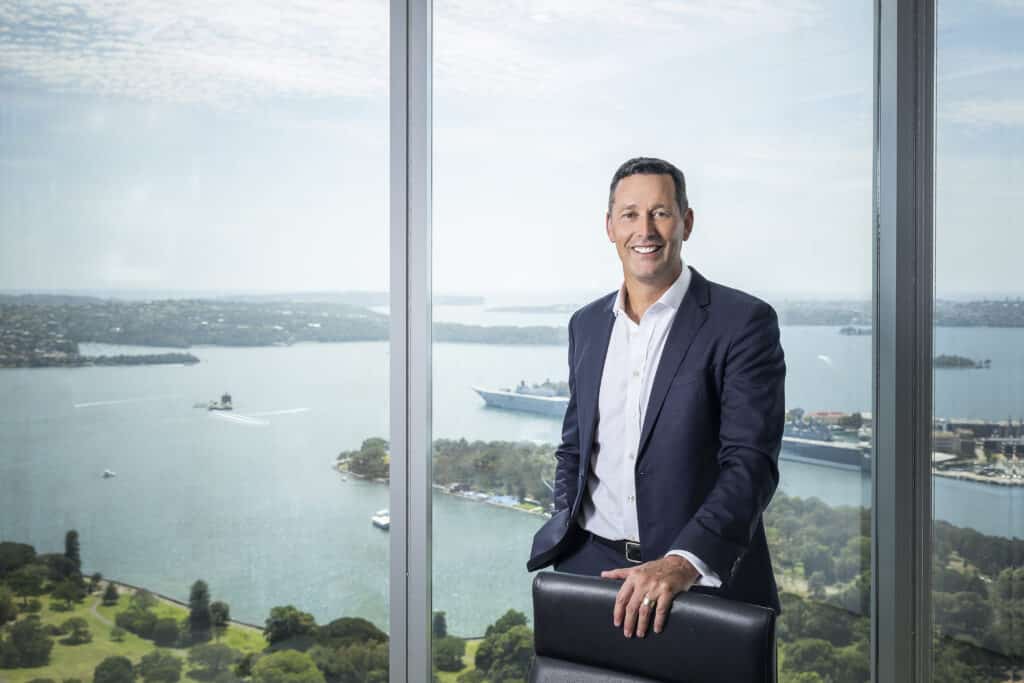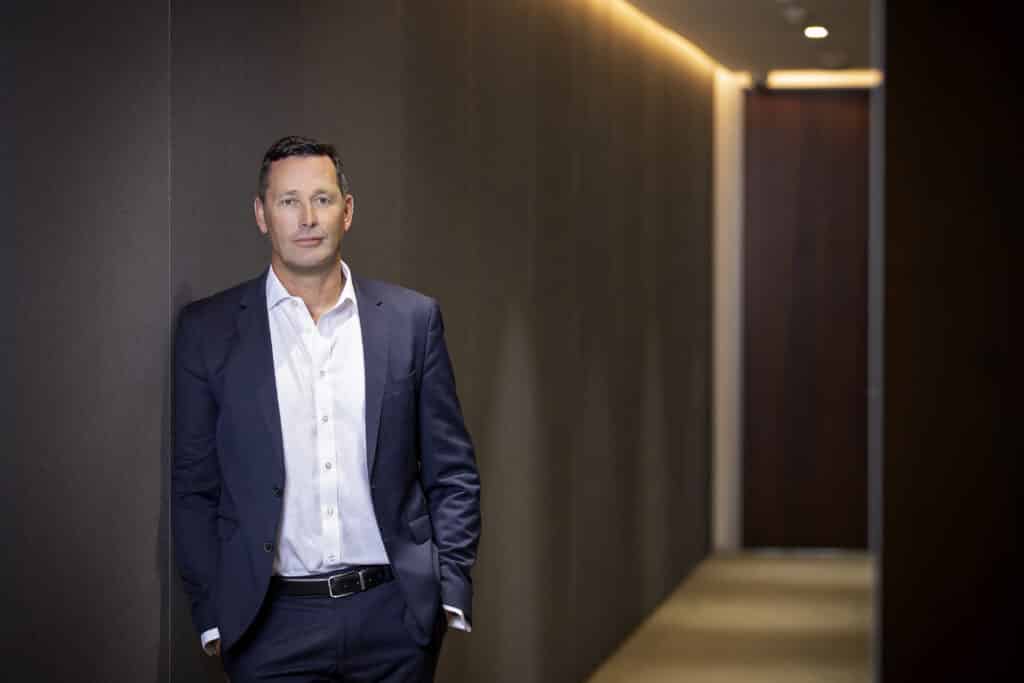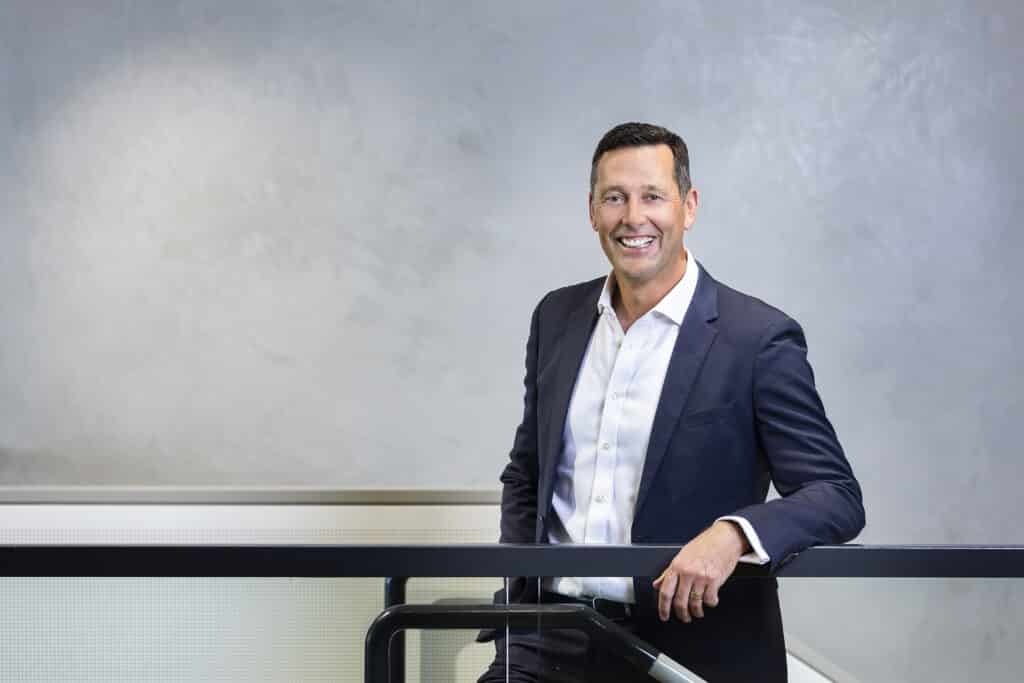When Andrew Landman was CEO of Ascalon, a private equity firm then owned by Westpac, the then head of HSBC Hong Kong, Mark McCombe, invited him to the Rugby World Cup in New Zealand.
But just when Landman was at the airport, McCombe rang to say he wouldn’t be joining him. “It was a bit of a shock.”
“I’ll ring you Monday,” McCombe said. “It’s all fine. I’ll tell you what happened.”
Sure enough, McCombe called Monday and said he’d joined BlackRock, the world’s biggest fund manager.
It was a seminal moment because it led to Landman eventually joining BlackRock in December 2012 after a lengthy interview process that included speaking with some of the investment giant’s founders, including Sue Wagner.
“In my mind I’m a kid from Umina,” he says. “How did I get access to this brilliant person?”
Landman is now Head of BlackRock Australasia, where he is seeking to combine the best of BlackRock’s vast global capabilities and insights with a local focus, a combination he dubs a ‘glocal’ approach.
“It’s a bit of a cliché, but we’re here to help. We are here to help with global knowledge and make it local.”
BlackRock is not just helping the super industry to deliver strong returns to Australian savers through its funds and investment solutions, but to meet big challenges, including the challenge of creating retirement solutions that give local retirees confidence they won’t run out of money, and the challenge of navigating complex areas like sustainability investing, in which BlackRock has been a global leader.

A surprising interview and the road to BlackRock
Landman describes Umina on the NSW Central Coast, halfway between Sydney and Newcastle where he grew up, as “God’s country”.
As a boy, he was interested in finance and maths, though he spent his “whole life” in the water swimming and surfing. Most of his schoolfriends became tradesman; though one, Greg Cooper, also entered the finance industry, becoming CEO of Schroders Australia.
After school, Landman completed a commerce degree at the University of Newcastle, majoring in accounting with a focus on securities, and interviewed at Bankers Trust, an experience he describes as both “positive and upsetting”.
Sporting an ill-fitting, army-green suit and paisley tie, which his mother has kept, a nervous Landman caught the train down from the Central Coast.
The interview lasted just eight minutes.
The late Max Powditch, then Executive Vice President of BT, asked about Landman’s running – Landman was aspiring to be a great triathlete by then – and whether he would compete in the Corporate Cup on Wednesdays if he joined BT.
“He didn’t ask me any financial questions at all. So, I just thought I had no chance. It was a lovely discussion about sport, so I thought I better refocus myself toward sport.”
But he was asked to join. “That was a huge moment for me because they had something really special back then.”
At BT, Landman won entry into the David Williams fellowship program and found himself in the middle of a gorge in the Northern Territory surrounded by crocodiles and snakes. A major benefit of the program is it gave him unrivalled access to BT’s leaders, many of whom have continued to influence his career.
Twenty years on, Landman also keeps in contact with many the cohort that completed the program and have now gone on to hold senior positions in the finance industry.
Landman held various roles at BT, then had stints at Challenger and Ascalon, before joining BlackRock, which posted him to Hong Kong, an experience he describes as “unbelievable”, particularly for his four “blonde kids” who learnt to speak Mandarin.
Landman returned to Australia in 2019 to take up his current position.
In Australia, the company provides two main services: a range of investment solutions and Aladdin, a technology risk system that helps clients manage their portfolios and understand risk.
As a microcosm of BlackRock globally, its investment capabilities expand from iShares ETFs, fixed income, multi-asset (including what it terms as ‘whole portfolio solutions’) through to private markets, including climate infrastructure, real estate, private credit and private equity.
We are here to help with global knowledge and make it local.
Landman says BlackRock works with a broad range of Australian clients across their entire portfolio, including sovereign entities, industry super funds, retail funds, wealth and asset managers, financial advisers as well as platform providers such as Netwealth.
BlackRock’s focus is to bring global, long-term private capital into Australia. “Global investors seek to access transformational investment opportunities here that can ultimately help Australia’s economy and society advance towards its goals.”

In step with Australia’s superannuation journey and the changing retirement landscape
The rise of BlackRock and the Australian super industry has been in parallel.
BlackRock was founded in 1988 in New York by a group of eight executives, including Wagner and high-profile CEO Larry Fink. Since then, the company has risen to become the largest investment manager in the world, managing US$9.1 trillion of funds on behalf of clients globally.
We need to ensure that the retirement offering makes people feel comfortable enough to spend some of the capital that is in super and trust the system and financial professionals that they won’t run out of money.
Australia’s compulsory superannuation system was introduced in 1992, just a few years after BlackRock’s inception, and now manages $3.5 trillion of Australians’ retirement savings.
BlackRock’s Fink has lauded superannuation, saying Australia should be “very proud” of it and that other countries should follow in our footsteps.
Landman himself says Australia’s super pool is “wonderful”.
But it also faces several challenges that are echoed in other financial markets around the world where BlackRock operates, particularly retirement.
Given Australians’ increasing longevity “we have to find a solution to retirement now”, Landman says.
“We need to ensure that the retirement offering makes people feel comfortable enough to spend some of the capital that is in super and trust the system and financial professionals that they won’t run out of money.”
Landman says the original concept of retirement in Australia was to take all the money out of super, buy a four-wheel drive and caravan and go around Australia, or even travel overseas.
But what we’ve seen is retirees “living relatively conservatively” because of a fear of money running out, a problem echoed in the Retirement Income Review that found Australian retirees were hoarding their wealth.
An investment offering that solves the retirement problem “isn’t there yet”, Landman says, but BlackRock is working with its clients, including the large super funds, to create solutions that provide Australian retirees with greater confidence.
Landman notes that in the US, BlackRock recently launched a suite of target-date ETFs for retirement.
But the retirement spending challenge is also a “perception problem”, which means advice has an important role to play. “Advice affordability needs to be solved,” Landman says. “That will solve that first perception of trust issue.”
While the superannuation industry is evolving towards a handful of mega-funds through mergers, Landman says it is important to maintain a competitive environment in the industry to “give people a choice of where they invest their retirement savings”.
Australia’s “fee obsession” has delivered the right outcomes “but at the end of the day, over a 30-year or 40-year accumulation, net returns should be the most critical outcome because net return is what you get in your pocket.”
A good, diversified portfolio, Landman says, will have both liquid and illiquid assets, including private market assets that have a higher fee attached. “But the net return over 30 years in that diversification could produce a better outcome.”
Sustainable investment opportunities and the direction ahead
BlackRock became heavily associated with the ESG acronym after CEO Larry Fink became a champion of sustainable investing. But the firm has been forced to weather a serious backlash from anti-woke activists and the Republican Party in the US.
Fink now says he has stopped using the term ESG because it has become ‘weaponised’.
For his part, Landman says he finds ESG a “pretty interesting” acronym. “I’ve never known an asset manager who has not considered governance”.
When it comes to the E in ESG, environmental, Landman says there are real issues in the world around energy resilience which creates investment opportunities. He says having diversified energy sources, like having a diversified portfolio, is sensible.
Landman is proud that BlackRock, via its Climate Infrastructure franchise, is funding and supporting the construction of the Waratah Super Battery, the single largest grid-scale battery in the world, at the old power station site at Lake Mummorah on the NSW Central Coast. “I didn’t have any say on where it was getting built, but I’m pretty glad it’s on the Central Coast.”
He notes that, despite the backlash in the US, the flows into its sustainable funds are still strong. In 2020, BlackRock had roughly US$200 billion of sustainable assets under management, which has more than tripled to US$700 billion globally today.
Ultimately, Landman says investing in the transition to a low-carbon economy is top of mind for many of its clients, and BlackRock’s focus has been to give clients access to the attractive investment opportunities in Australia and globally.
So, what is it like working for Larry Fink, one of the most high-profile, powerful leaders in global finance?
Landman says Fink is one of the few Wall Street execs that is globally known on a first name basis, “Larry”.
Landman has spent considerable time with Fink and he describes him as an incredible individual and a good person.
“He’s a very nice, considerate man. He’s the youngest 70-year-old I’ve ever met. His inquisitive nature is unbelievable. He really wants to learn. (That evening, Fink was meeting Australian Prime Minister, Anthony Albanese, at APEC.)
“He can capture and retain all this data and then he is able to process how he can best use that data.”
Fink also has “wonderful phrases” to inspire the company’s more than 19,000 or so staff. He encourages them to become ‘students of the firm’ – to engage closely with colleagues around the globe – and to become ‘students of the market’.
“He expects everyone to continuously learn about the market,” Landman says. “Because our clients expect us to. And he [Fink] will ask you your personal view and it’s ok if it differs from his. He wants to hear contrarian views.”

Finding balance and having a positive impact
Landman has a high-powered career but also has a hectic personal life raising his four children, a 14-year-old, 11-year-old twins and an eight-year-old.
How does he manage?
“I don’t believe in work-life balance,” he says. “I believe in life balance. You’ve got to have life balance. Work is an inherent part of life so it’s a matter of taking it into account in the same way we think about our family and our mental/physical health.”
I want to make sure that we keep giving opportunities to our talented people. I have been very fortunate to have strong supporters throughout my career and I want to be that person for my team.
To clear his mind and relax, Landman ski paddles in Sydney Harbour in the morning (on the morning of our interview, a shark had swum under his ski), and surfs with the kids. “Although one of my 11-year-olds is starting to surf better than me. I thought I had a few more years and I’m like, damn it.”
But most importantly, Landman “has an extremely supportive wife who is an incredible teammate in life and I’m hugely appreciative of her contribution to that.”
At BlackRock, Landman says his focus is on helping other staff members have the great careers that he been fortunate enough to have. “I grew up in Umina and I’m sitting here running BlackRock Australasia. It’s been incredible.”
“I want to make sure that we keep giving opportunities to our talented people. I have been very fortunate to have strong supporters throughout my career and I want to be that person for my team.”
Landman says he likes to walk the floor of the office, which helps him understand people, particularly their stressful life events, and he also likes to emphasise that careers are long term proposition.
He also encourages colleagues to participate in all aspects of the community, from coaching sports to volunteering, to supporting significant cultural activities that matter most to them.
If BlackRock asks him to move to another role in the firm, if it suits his family, he would do it. (He says he’s built a “great bench” in Australia, including his deputy Country Head Jason Collins.)
But for now, Landman is focused on helping clients, like Australian super funds, to deliver for their member base. “At the end of the day that would have a direct positive impact on the many Australians that rely on them to build strong financial futures.”




































